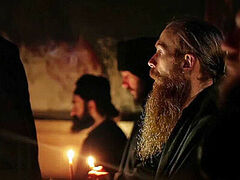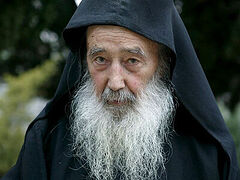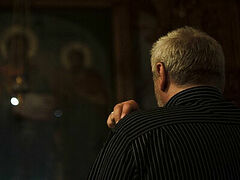Part 1/1: Let us Fast in Earnest
Part 1/2: The Meaning and Significance of Fasting
Part 1/3: Accustoming Ourselves to Fasting
Part 1/4: Spiritual Fasting
Part 2/1: On Prayer. What is Prayer?
Part 2/2: How to Prepare for Prayer?
Part 2/3: How to Pray?
Part 2/4: What to Do After Prayer?
Every true Christian must always remember and never forget that he needs to be united with the Lord and Savior with his whole being—we must allow Him (the Lord) to dwell in our hearts and minds; we must learn to live His all-holy life. He received our flesh, and we must receive His flesh and All-Holy Spirit—receive and keep them forever. Only such a union with our Lord will bring us that peace and favor, that light and life that we lost in the first Adam and is now being returned to us in the face of the Second Adam, the Lord Jesus Christ. And for such a union with the Lord, after the Communion of His Body and Blood, the best and most reliable means is the noetic Jesus Prayer, which is as follows: “Lord, Jesus Christ, Son of God, have mercy on me!”
Many Holy Fathers teach us this prayer in various ways. St. John Climacus says:
Strive to enclose your mind in the words of the Jesus Prayer—pray aloud and with your mind, and attentively: The heart cannot but participate in attentive prayer. Thus, whoever prays in this way will pray with his mouth, mind, and heart. And succeeding in prayer, he will acquire the prayer of the heart and nous [or mind], drawing Divine grace to himself.
This method of St. John of Climacus is the simplest, the most comprehensible, and the best.
Among our Russian ascetics, St. Nilus of Sora counsels silence of thought—not thinking about anything during prayer, be it good or bad. Instead of any thought, he directs us to constantly gaze into the depths of the heart and say: “Lord, Jesus Christ, Son of God, have mercy on me, a sinner!” You can pray, according to the teaching of St. Nil of Sora, whether standing, sitting, or lying down, without constraining the body so the spirit might freely act in it, only holding your breath so that you breathe quietly and infrequently.1
Fr. Seraphim of Sarov advises beginners to continually practice the Jesus Prayer. When praying, he says, take heed to yourself, that is, gather the mind and unite it with the soul. At first, for a day or two or more, say this prayer only with the mind, separately, paying special attention to every word. When the Lord warms your heart with the warmth of His grace and unites you into one spirit, then this prayer will unceasingly flow within you and will ever be with you, delighting and nourishing you. At first you should say the Jesus Prayer with your voice, that is, with your mouth, tongue, and speech—audible to yourself. When the mouth, tongue, and senses are sated with prayer pronounced aloud, then audible prayer ceases and it begins to be pronounced in a whisper.
“Then,” says the holy Russian Monk Dorotheos,2 “the prayer of the heart and mind will begin to move of its own accord, to work unceasingly, circulating and acting, at any time, during any work, in any place.”
In order not to get lost in the various methods and definitions of the Jesus Prayer, it’s enough to follow these teachers: St. John Climacus, St. Nilus of Sora, Fr. Seraphim of Sarov, and Dorotheos. So, whether you’re standing, sitting, walking, or lying down, train your thoughts to detach from everything, silence your mind (St. Nilus of Sora); take heed to yourself, gather the mind and unite it with the soul. At first, for a day or two or more, say this prayer only with the mind, separately, paying special attention to every word (St. Seraphim of Sarov); strive to enclose your mind in the words of the Jesus Prayer—pray aloud and with your mind, and attentively, with the participation of the heart (St. John Climacus); first say the prayer aloud to yourself, then in a whisper, and learn to say it with your mind (Dorotheos).
Based on all that has been said about the Jesus Prayer, we can form an idea of its praxis. “When you inhale, say: ‘Lord Jesus Christ, Son of God,’ and thus mentally bring the Lord into your heart; and when you exhale, continue: ‘have mercy on me, a sinner!’ and thus mentally expel your sinfulness by the name of the Savior.” This method of reciting the Jesus Prayer is the easiest to learn, and it can be prayed day and night.
What is the prayer rope? What does it mean? The prayer rope we carry reminds us of our duty to pray the Jesus Prayer without ceasing; but it also serves as an aid in counting prayers, especially when reading the rule of St. Pachomius the Great,3 which calls for 1,200 Jesus Prayers during the day and 1,200 at night—2,400 in total, with 100 prayers an hour.
Is the Jesus Prayer necessary for the laity as well—not just for monastics? It is absolutely necessary, because every Christian, as was said at the beginning of this teaching, must be united with the Lord in his heart: And the best means for this connection is the Jesus Prayer.
Amen.







